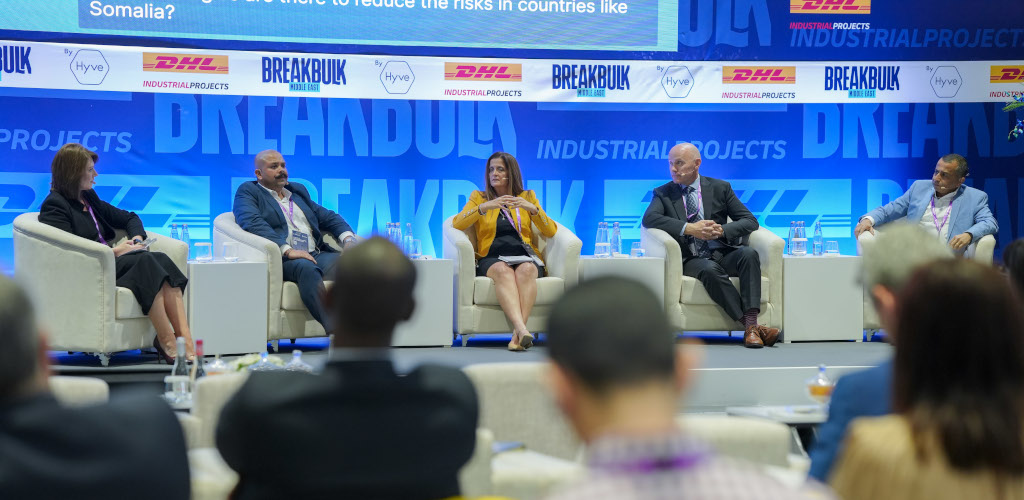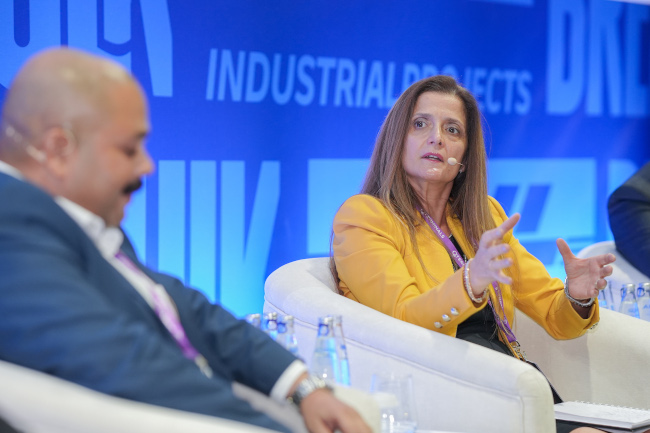BBME Panelists Laud Project Opportunities in Fast Growing Region
 By Simon West
By Simon West
Hiring local talent is key for success in East Africa, a tactic that affords companies a deeper understanding of local market dynamics, speakers said during a main stage panel session at Breakbulk Middle East 2024.
The session, moderated by Vanessa Welch, founder of V3 Consulting, focused on the opportunities and challenges for the project logistics supply chain in East Africa, home to some of the world’s fastest growing economies.
Rossella Lospennato, general manager of Alpha Logistics, a marine logistics specialist operating in Africa, said her team in Somalia, where the company has been active since 2009, was “fully Somali”.
.jpg?width=500&height=333) “We have people who have been with us for years,” Lospennato said. “We have a program in the country for training young people coming out of university and school. We have strong knowledge of the environment, and this is the only way to work (in the region) and offer solutions to our clients.”
“We have people who have been with us for years,” Lospennato said. “We have a program in the country for training young people coming out of university and school. We have strong knowledge of the environment, and this is the only way to work (in the region) and offer solutions to our clients.”
Udit Rathore, head of ground and rail in East Africa for CEVA Logistics, agreed, telling listeners that 99 percent of his company’s staff in the region were from the local area, “and that’s a great plus to have,” he said.
“We have internal promotions and training, so staff get trained on different aspects of the operations. And we have done that quite successfully over the years."
Manoj Kumar, head of supply chain compliance for Shelf Drilling, said his company had 100 percent local content “where possible”, adding that it can take time when entering a new market and to get the “right skillset and to have the right people… but that is something that we try to work on.”
Turning to East Africa’s soaring project market, Rathore said volumes at the region’s ports were growing by 5 to 7 percent on a yearly basis. The executive pointed to several large-scale projects driving business, such as the East African Crude Oil Pipeline (EACOP) linking Uganda with Tanzania.
“That in itself is a mega-project of great magnitude. And the amount of employment that project is generating is massive. The same goes for Mozambique, which has Africa’s second largest gas reserves. When we talk of natural resources, East Africa is blessed.”
Malcolm Corsie, regional general manager of wellstream processing for oilfield services company NOV, also pointed to the region’s upstream potential, especially in liquified natural gas (LNG).
“LNG is going to be the first big boost we’re going to see and that will probably start offshore as it’s less capex intensive to convert some of the existing boats they have into FLNG (floating liquefied natural gas).” He added: “But just because it’s an offshore development, doesn’t mean it will have a heavy reliance on the local logistics market. These boats aren’t self-sustaining – they need to be brought in and supported and maintained. That for me will be the first thing, and it will be 2025, 2026 onwards.”
Corsie also pointed to the “very interesting” oil sector in Uganda. “We spoke about the pipeline, but you’ve still got find it, produce it, refine it. I think Uganda is going to be quite big as well.”
Welch also quizzed the panelists on some of the challenges for foreign business operating in the region, and for Corsie, it was having “boots on the ground”.
“If you’re going to develop a new field in Uganda, and we’re going to bring process equipment in or build something there, one of the first things we need to know is the logistics. And it’s not just how you get it there, but also size and weight limitations, bridge crossings and all these things that often aren’t thought about.
“We need the boots on the ground, the local knowledge to help us with that, because otherwise there’s no point in spending tens or maybe hundreds of millions of dollars on equipment you can’t bring to site.”
